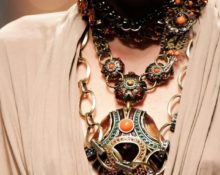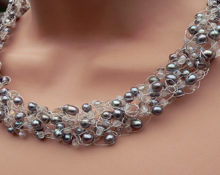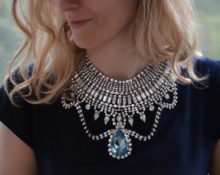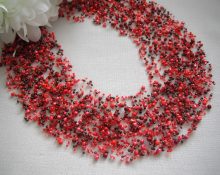The category of jewelry and costume jewelry designed to emphasize the beauty of the neck and oval of the face includes a necklace. Some such jewelry additionally draws attention to the neckline, others to the shape of the collarbone. In order not to miss and choose an option that can visually highlight your dignity, you should understand the classification of necklaces. So what are they?
What types of necklaces are there?
Neck jewelry is distinguished by length, location of the clasp, width and purpose. Some of them are suitable for wearing on a weekday (princess), others, with rare exceptions, should be put aside until a significant moment in life (sautoir).
Rope
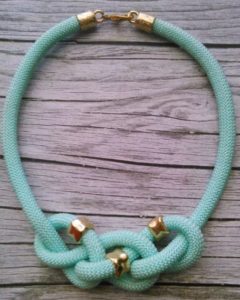 The second name is sautoir. It is one of the longest jewelry for the neck and décolleté. The minimum level is set at 112 cm - a shorter rope simply does not exist. The maximum mark can reach 180 cm. With rare exceptions the sotoir is not intended for everyday use. Its scope of application: special events, public appearances.
The second name is sautoir. It is one of the longest jewelry for the neck and décolleté. The minimum level is set at 112 cm - a shorter rope simply does not exist. The maximum mark can reach 180 cm. With rare exceptions the sotoir is not intended for everyday use. Its scope of application: special events, public appearances.
Princess
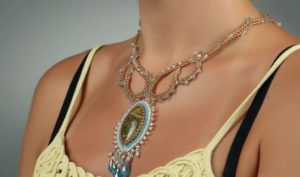 Classic variation.The length of the thread varies between 42–48 cm. These parameters are enough to ensure that the product does not fit around the arch of the neck, but also does not reach the chest. Characteristics of a traditional princess necklace:
Classic variation.The length of the thread varies between 42–48 cm. These parameters are enough to ensure that the product does not fit around the arch of the neck, but also does not reach the chest. Characteristics of a traditional princess necklace:
- discreet form;
- the use of classic precious stones (for example, pearls);
- monotony.
Products created according to modern concepts often do not have a single canonical characteristic. They are colorful and catchy.
Choker
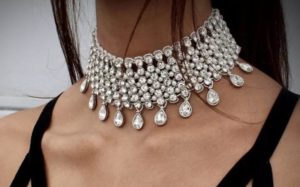 A short necklace that runs around the arch of the neck and belongs to the classic variations of jewelry (in demand among the highest circle of European aristocracy). 5–10 cm longer than the collar. Often equipped with a girth adjustment mechanism. This type of necklace can be intended for both women and men. There are unisex variations.
A short necklace that runs around the arch of the neck and belongs to the classic variations of jewelry (in demand among the highest circle of European aristocracy). 5–10 cm longer than the collar. Often equipped with a girth adjustment mechanism. This type of necklace can be intended for both women and men. There are unisex variations.
Plastron
A massive necklace in which the entire thread or only the central part is very thick. Due to its size, the decoration covers most of the chest.
Collar
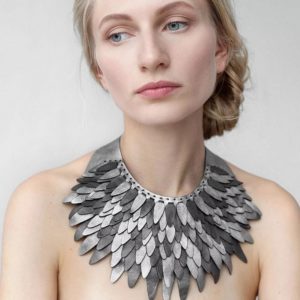 Flat short decoration. The shape and method of wearing resembles a collar. Second name for collar: collar. Standard length: 30–35 cm. The width can be any. There are products that cover the entire neck - from its beginning to the chin.
Flat short decoration. The shape and method of wearing resembles a collar. Second name for collar: collar. Standard length: 30–35 cm. The width can be any. There are products that cover the entire neck - from its beginning to the chin.
Initially, the collar was the prerogative of the strong half of humanity. It was worn by knights. It served to indicate membership in a specific order.
Important! In some circles - for example, church, political and aristocratic - the collar is used as an identification element. Serves to recognize the status of a person. In this case, the type of pendant matters, as well as the color or shape of the links.
Slavage
There is nothing more than a ribbon encrusted with precious stones. The central element usually falls down and is placed in the valley between the breasts.
Important! The concept of this necklace was invented in the 18th century. The decoration fits perfectly with clothing made in accordance with the fashion standards of the 18th and 19th centuries.
Riviera
The key difference from other subtypes of necklaces lies in the method of attaching individual elements. They go one after another, there is no gap between them and it is impossible to see the base. The technique is primarily intended for creating products for celebrations and significant events.
Clasp
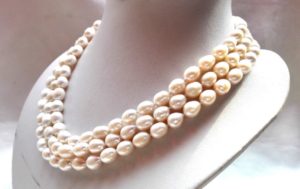 This type is characterized by a front clasp. Usually it comes in a non-standard shape, due to which the necklace does not lose its functions, and others do not have suspicions about the incorrect use of the jewelry.
This type is characterized by a front clasp. Usually it comes in a non-standard shape, due to which the necklace does not lose its functions, and others do not have suspicions about the incorrect use of the jewelry.
Important! The idea of placing the locking mechanism at the front rather than at the back arose due to the fact that previously the clasp was considered the most expensive element of neck jewelry. Aristocrats thus simply showed off the carefully executed work of a jewelry master.
How is a necklace different from a necklace?
Both items belong to the category of jewelry that is usually worn around the neck.. The differences between them are visible in the following points:
 working on a necklace requires more resources, which affects the cost of the finished product (there are exceptions to the rule);
working on a necklace requires more resources, which affects the cost of the finished product (there are exceptions to the rule);- the necklace has identical links along the entire length, but the middle part of the necklace is necessarily pronounced (it can differ in color, size of the elements, their shape and type);
- the word “necklace” has Slavic roots, and “necklace” came into our language from French.


 working on a necklace requires more resources, which affects the cost of the finished product (there are exceptions to the rule);
working on a necklace requires more resources, which affects the cost of the finished product (there are exceptions to the rule); 0
0